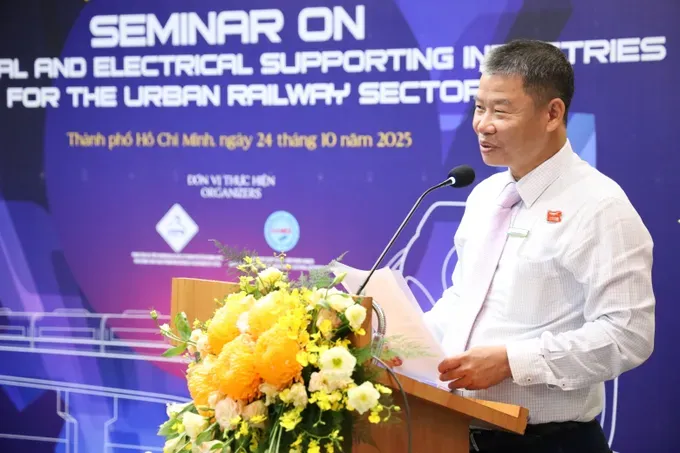The Ho Chi Minh City Investment and Trade Promotion Center (ITPC), in coordination with the Ho Chi Minh City Association of Mechanical and Electrical Enterprises (HAMEE), held the event.
At the seminar, Mr. Tran Vo Anh Minh, Deputy Head of the Urban Railway Management Division under the Ho Chi Minh City Department of Construction, shared that the goal is for the city’s urban railway system to meet 30–40 percent of public transport demand by 2035.
After 2045, this proportion is projected to reach 40–50 percent, helping to build a modern urban transport infrastructure system, with the urban railway network serving as its backbone.
Numerous investors and private enterprises are interested in participating in Ho Chi Minh City’s urban railway system. For example, Vingroup is focusing on the urban railway line, connecting downtown Ho Chi Minh City and Can Gio; THACO Group (Truong Hai), together with Hyundai Rotem, plans to build Metro Line No. 2 segments, including Ben Thanh – Tham Luong, Ben Thanh – Thu Thiem, and Thu Thiem – Long Thanh; and Sovico Group intends to participate in the construction of Urban Railway Line No. 1.
Vice Chairman of the HAMEE Tran Thanh Trong stated that Vietnamese mechanical and electrical enterprises are fully capable of handling the installation of supporting systems for urban railways, including power supply systems, backup power generators, ventilation systems, automatic control systems, firefighting systems, elevators and lifts.
However, complex equipment, such as train cars and railway tracks, requires coordination and investment to be implemented now. Therefore, HAMEE recommends that relevant authorities, especially the Ho Chi Minh City Urban Railway Management Board, prioritize the use of products and services produced by domestic enterprises in order to reduce investment, operation and maintenance costs and increase self-reliance for the national railway sector.

For items that must use imported equipment, there should be regulations requiring a technology transfer roadmap, as well as operation and maintenance training for domestic enterprises. The Bidding Law No. 22/2023/QH15 and Decree No. 24/2004/ND-CP already provide incentives for domestically produced products based on the localization ratio.
Additionally, Resolution No. 188/2005/QH13 of the National Assembly on special mechanisms for developing the urban railway network in Hanoi and Ho Chi Minh City also stipulates that general contractors and subcontractors must prioritize using products, goods and services that can be manufactured or supplied domestically.
























